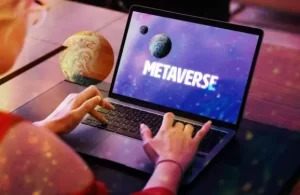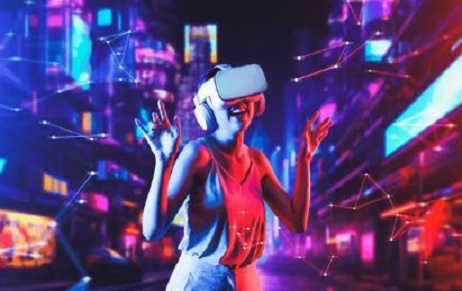INTRODUCTION Being applicable in many ways virtual reality or VR has now revolutionized several industries…
IP And Metaverse
A continuous, shared, and immersive 3D environment called the metaverse is where users re expected to connect, play, and work. It is regarded as the mobile internet’s substitute. Our real lives and our virtual lives are becoming more and more linked as a result of technological advancements. The metaverse, where people will largely be engaged in leading virtual lives, will be the peak of such blending. The development of virtual reality, augmented reality, distributed ledger technology, and blockchain are the main contributions to the Metaverse.

Metaverse and IP linkage
First, presence; second, compatibility; and third, uniformity are the three pillars or core components of the Metaverse. Compatibility here refers to the capacity to move freely and easily among the virtual items as well as within the digital space, while presence refers to a sense of embodiment or one’s presence with others in a virtual environment. Since we see avatars being used in E- meetings or virtual products like bitcoins, compatibility is not a novel concept; rather, it is widespread in today’s world. The last pillar, uniformity, enables platform and service compatibility throughout the Metaverse.
There is a direct linkage between the Intellectual property rights and metaverse. Due to the advancement in technology in near future, there will be IP objects both in virtual and real world. Due to the vast competition among the goliath companies many new products will launch into the virtual world in coming times. In terms of consumer branding, the Metaverse is the “next big thing” that will determine how brands connect with consumers. Everything in the Metaverse will be virtual and made up, including brands and branded goods. To protect these brands and their ideas we need the IPR laws. Any product or equipment are covered under patent protection whereas software technologies will be protected under copyright.
Ownership of IP
One of the most crucial issues to be resolved is the ownership of intellectual property created in the metaverse, given that every component of the metaverse, including the platform, underlying software, technology, the so-called “real estate in metaverse,” content, images, music, designs, brands, and audio-visuals, is a different type of intellectual property. Therefore, it is likely that the existing concepts and classifications of intellectual property will need to be expanded and reorganized to take into account the particular needs of the digital-only world. In a completely virtual situation with no jurisdictional boundaries, another factor to take into account is the geographical extent pertinent for the legal protection of a copyright or other intellectual property.
Unless otherwise specified in a contract, the owner of any intellectual property is considered to be the author or creator under Indian copyright law. However, there is a chance that the host platform might assert ownership in the works when intellectual property or material is developed in the metaverse utilising underlying technical tools or Artificial Intelligence (AI) provided by the metaverse platform. Therefore, the conditions of usage of a metaverse platform will ultimately define who owns any works or assets generated on that platform.
Privacy concerns and IPR Infringement
The Metaverse platform is anticipated to collect enormous amounts of sensitive personal data due to the anticipated number of users. In the privacy policy of any AR-VR gadget, it is commonly asserted that it will capture data about an individual’s biological information, physical surroundings and other personal information. Due to the collection of such biometric data, this would be considered “sensitive personal data” under the IT Rules.
There is now no government legislation that may give remedies for virtual IPR infringements, blockchain technology may be an option for businesses. Once data is added into a blockchain, it cannot be removed or modified until a consensus mechanism is used. A blockchain is a permanent and immutable record of data.
When a company’s virtual products or services are available on more than one Metaverse platform, this technology can be deployed. The intellectual property rights in content connected to products and services are included and protected by this technology. Attached are descriptions of the relevant goods, ownership information, and the range of the pertinent rights. The applications that are legal and illegal for the product can be determined using this information.
Conclusion
To sum up, there are presently no explicit laws in India that regulate Metaverse in a suitable manner, which raises the danger for its users. When it comes to ensuring the secure operation of this new platform, there is a legal hole opening in front of us. Regulators must step in now, while Metaverse is still in its infancy, before the technology improves because, if they wait, it will be more difficult to regulate after there is a higher degree of user dependence. Although disruptive technologies like virtual reality, augmented reality, blockchain, etc. have enormous promise in their applications, their effects on established legal systems have led to some scepticism.
Author: Sarthak Mishra– a student at Rajiv Gandhi School of Intellectual Property Law, IIT Kharagpur, in case of any queries please contact/write back to us via email [email protected] or at Khurana & Khurana, Advocates and IP Attorney.



